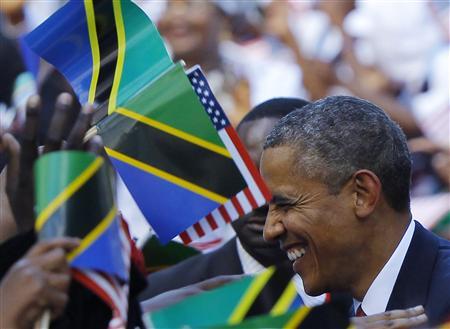(Reuters) – A White House plan to curb illegal trafficking in rhino horn, elephant tusks and body parts from other endangered wildlife could have the side benefit of helping to stabilize parts of Africa plagued by insurgent groups, military and political analysts say.

President Barack Obama’s announcement of the $10 million plan, made in Tanzania on Monday, was a watershed moment in the expanding field of environmental security, according to Kent Butts, who until May was the director of the national security issues group at the U.S. Army War College.
Paramilitary groups like the Uganda-based Lord’s Resistance Army and al Shabaab, which is allied with al Qaeda, have been using wildlife poaching to fund their activities in Africa, Butts said on Tuesday by phone from Pennsylvania.
David Hayes, deputy secretary at the Interior Department, said illegal trade in wild animal parts has escalated as organized crime syndicates have become involved.
“Al Shabaab’s recent merger with al Qaeda makes the link between wildlife poaching and extremist ideology and terrorism more clear,” he said. “The fact that both those groups have clearly been implicated in illegal poaching make it difficult to say this isn’t a meaningful national security issue.”
Rhinoceros horns, prized as an aphrodisiac in parts of Asia, sell on the black market for $30,000 a pound, making them “literally worth greater than their weight in gold,” Grant Harris, senior director for the White House National Security Council, told reporters traveling with Obama in Africa.
Ivory from elephant tusks sells for $1,000 a pound, contributing to a global illegal trade in animal parts of between $7 billion and $10 billion a year, Harris said.
The Obama plan comes after more than a year of international efforts to bring this issue forward, including a “call for action” by former Secretary of State Hillary Clinton. There have also been initiatives by the United Nations, CITES (an international treaty organization dealing with trade in endangered species), the British royal family and the Group of Eight industrialized nations.
TASK FORCE
With $10 million in State Department funds added to resources at different U.S. agencies, the White House plan will set up a task force to handle illegal wildlife trafficking. It will be led by the secretaries of State and Treasury and the U.S. attorney general and requires a national strategy to combat wildlife trafficking within six months.
Obama’s focus will re-prioritize matters at U.S. government agencies to focus in a more coordinated way on wildlife poaching and trafficking, Hayes said in a conference call.
The plan also calls for an expert on African wildlife from the U.S. National Fish and Wildlife Service to be based in Dar es Salaam, Tanzania, to work on the problem, at the request of Tanzanian officials, Hayes said.
John Scanlon, secretary-general of CITES (the Convention on International Trade in Endangered Species of Wild Fauna and Flora), saw security implications in Obama’s plan, with the potential to improve stability in Africa and provide support for local officials to combat wildlife trafficking.
The small amount of new money involved won’t necessarily be a hindrance, Scanlon said from Switzerland: “In combating wildlife crime … you can talk about investments in the millions and tens of millions (of dollars) and you can achieve a lot. It’s not like if you’re talking about combating climate change, where you’re talking about multiple billions.”
Vanda Felbab-Brown, a Brookings Institution expert on non-traditional security threats, voiced concern about the pervasiveness of the problem and the difficulty of curbing demand, with most markets for trafficked animal parts outside the United States.
Corruption extending from park rangers to government leaders in parts of Africa will make law enforcement challenging, Felbab-Brown said by phone from Afghanistan.
(Reporting by Deborah Zabarenko; editing by Christopher Wilson)





